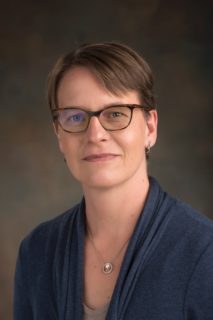Article begins
1975–2019
 Sonja Luehrmann, anthropologist, historian, and associate professor at Simon Fraser University passed away on August 24, 2019.
Sonja Luehrmann, anthropologist, historian, and associate professor at Simon Fraser University passed away on August 24, 2019.
Luehrmann began her studies in Germany. Early on, she focused on topics that would become central to her wide-ranging, prodigious, brilliant, and yet all-too-brief scholarly career, especially the politics of religious and cultural difference as well as the contested and shifting meanings of history. While Luehrmann’s specific topics would change, from indigeneity to internet matchmaking to secularism, prayer, and abortion, the one consistent theme was her in-depth engagement with Russian empire, tracing its geographical and historical reach before, during, and after the Soviet period.
In Frankfurt am Main Luehrmann conducted her first ethnographic research with an Orthodox Russian congregation engaging in mission work abroad (1996–1997). This was followed by two consecutive summers as a research fellow at the Smithsonian Arctic Studies Center in Anchorage, Alaska, after which she went on to earn an MA with distinction in cultural anthropology from Johann Wolfgang Goethe University, Frankfurt in 2000. Luehrmann later published her MA thesis with University of Alaska Press as Alutiiq Villages Under Russian and US Rule (2008). With this book, the first of three she would publish over the ensuing decade, Luehrmann showed an interest in Russian political history, especially its paradoxical mediation of identity, experience, and difference in the present. Also readily apparent in this early work is an incredible aptitude for combining historical and anthropological sources of evidence in compelling and original accounts of past and present.
From these impressive beginnings, Luehrmann entered the doctoral program in anthropology and history at the University of Michigan in 2002. Supervised by Alaina Lemon, Webb Keane, William Rosenberg, and Douglas Northrop, her 2009 dissertation drew on historical and ethnographic research in the Volga region of Russia. This study of Soviet atheism and its relationship with the post-Soviet religious revival among Christians, Muslims, pagans, and others became the basis for Secularism Soviet Style: Teaching Atheism and Religion in a Volga Republic (2011, Indiana University Press). In this book, and elsewhere in her research and writing, Luehrmann made connections across historical and conceptual divides. The secular was not merely affiliated with liberal modernity, nor was it unrelated to the emergence of post-Soviet religious movements, which relied on how Soviet life had taught Mari to imagine and create new futures.
In subsequent work, Luehrmann continued to explore ethnographic and archival evidence of religion and antireligion in tension, especially with research on antiabortion activism in the Russian Orthodox Church, which included observing pregnancy consultation centers, pilgrimage sites, and archives throughout Russia. The methodological problem of Soviet era interest in documenting the “puzzle” of religious life became the subject of her third book Religion in Secular Archives: Soviet Atheism and Historical Knowledge (2015, Oxford University Press). Finally, as principal investigator for a Social Science Research Council-funded, global research project on Eastern Christianity, she developed the edited volume Praying with the Senses (2018, Indiana University Press).
Sonja Luehrmann is survived by her three children; her husband, historian Ilya Vinkovetsky; and extended family in Germany. She will be sorely missed. (Joshua Reno)
Cite as: Reno, Joshua. 2019. “Sonja Luehrmann.” Anthropology News website, September 9, 2019. DOI: 10.1111/AN.1286

